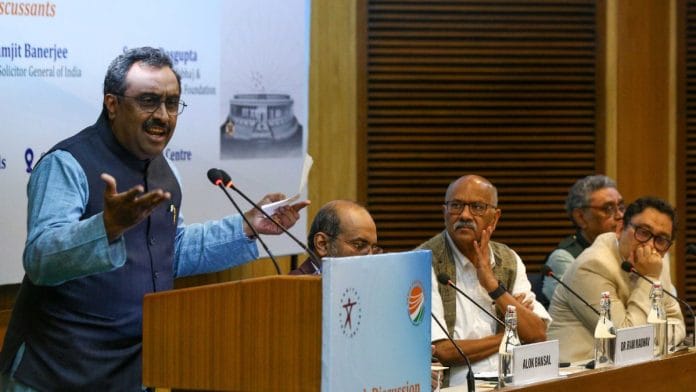New Delhi: India’s quest for a self-drafted Constitution began much before 1946. “At least 25 to 30 years before the actual commencement of the Constituent Assembly,” said Ram Madhav, former National General Secretary of the Bharatiya Janata Party, and a prominent voice on governance and policy.
Speaking at the launch of his new book, Our Constitution, Our Pride, Madhav reflected on the key milestones that shaped the Constitution, and how India’s identity is rooted in the document.
“What defines India is its Constitution because we share our geography, history, and culture with our neighbours. It is our Constitution that governs our destiny and has framed the way we have lived.”
The discussion went well beyond history, delving into the living, evolving nature of India’s foundational text—a document shaped by both political ideals and power struggles over the last seven decades. The event, held at India Habitat Centre’s Gulmohar Hall, was packed to capacity, with many important attendees participating in the engaging conversation. The diverse perspectives of panelists such as ThePrint Editor-in-Chief Shekhar Gupta, Additional Solicitor General of India Vikramjit Banerjee, and former Rajya Sabha MP Swapan Dasgupta, added depth to the discussion.
“I don’t know what holy books do, what power holy books have. But the Constitution has power. If you mess with it, it will punish you severely,” said Shekhar Gupta.
Not a slim document
Starting with the 1928 Nehru Committee Report, Ram Madhav recalled how key ideas like the Panchayati Raj system, fundamental duties, and even the Hindu Code Bill were left out initially (though incorporated later), making some leaders question why Gandhi’s vision was missing from the Constitution.
“At one point in the Constituent Assembly, leaders stood up and asked, ‘Where is Gandhi in this Constitution?’ So much debate happened, but it was decided not to have a Panchayati Raj system because both Ambedkar and Nehru believed India needed centralised planning for development – which Gandhi abhorred,” said Madhav.
Then, Ram Madhav talked about the healthy debate that took place over Article 370.
“Leaders questioned why Kashmir was given special status while other regions with unique identities were not. ‘Why not to Awadh? Why not to Vadodara? Why only Jammu & Kashmir?'” he quoted members as saying.
Shekhar Gupta took the conversation to more recent events, stressing how the Constitution protects us in the face of incidents such as the recent Kunal Kamra controversy.
“The Constitution is not such a slim document. People carry some version of it in their pocket, or comedians can also flaunt it. In spirit, that’s a good point. The Constitution protects us, but the problem with the Constitution is that it is very long-winded,” he said.
A guiding framework
As the event concluded, attendees raised questions about the adaptability of the Constitution in the face of modern challenges. Ram Madhav reiterated that the Constitution must be understood not just as a legal text but as a guiding framework that shapes India’s democratic values.
“What is most important is not just the letter of the Constitution, but its spirit. What is needed is constitutional morality, the ability to follow it not just in words, but in essence. As we celebrate 75 years of this Constitution, our greatest responsibility is to uphold that constitutional morality,” he said.
Shekhar Gupta elaborated on this by questioning whether some long-standing constitutional principles need to be reassessed in today’s context:
“Now, seven decades later, does that argument need to be revisited? When you speak of revisiting, what do you have in mind? What is the problem you are trying to fix? Or are you finding a solution for a problem that doesn’t exist?”
Vikaramjit Banerjee, Additional Solicitor General of India, highlighted how the judiciary has played a pivotal role in shaping the Constitution beyond its written text. He pointed out that several fundamental aspects of governance—such as the collegium system for judicial appointments—were not originally part of the Constitution but emerged through judicial interpretation.
“The Constitution is not only the text. The Constitution is also how it’s being worked out. Some of the most important parts of the Constitution, including the collegium, exist not because of the original text, but because of judgment law,” he said, adding that it reflects how India has “Indianised” its Constitution, adapting it to social and political realities over time.
There was also a question raised about whether basic structure doctrine remains untouchable or if it’s time to revisit it.
“Efforts have been made to try and modernise, change, and make the Constitution more relevant. Vajpayee set up a commission, Advani put his heart into it. But every time, the basic structure argument comes in—should it be revisited?” said Gupta in response.
(Edited by Zoya Bhatti)






